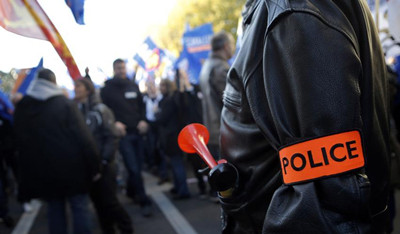警察與緊縮
Down beat
下降趨勢
Budget cuts may not affect crime—but they will change politics
削減預算可能不會影響犯罪—但能改變政治
Good old-fashioned policing
傳統治安維持方式
POLICING in England and Wales is in crisis and things are about to get nasty. That, at least, is what the coppers would have you believe. Ahead of the annual conference this week of the Police Federation, the policemen's union, Steve White, its leader, cautioned that budget cuts could mean a move towards more“paramilitary” policing, with officers using water cannons, rubber bullets and tear gas. Theresa May, the home secretary, accused him of scaremongering. Mr White's logic is certainly fuzzy. But his warnings highlight the deteriorating relations between the police and their traditional allies, the Conservatives.
英格蘭和威爾士的警務正處于危機之中,并且情況還會越來越糟。至少警察會讓你相信這一點。在本周警察聯合會(警察聯盟)的年度會議之前,聯合會領導人Steve White警告說預算削減意味著更多警察會朝著用高壓水槍、橡皮子彈和催淚瓦斯行動這類更加“準軍事”的警務發展。內政大臣特里薩·梅指責他是危言聳聽。White的邏輯確實有失偏頗。但是他的警告卻表明了警察與其傳統的盟友保守派關系的惡化。

Police today are warier of heavy tactics than they once were. Chris Donaldson, a retired police officer, was on the streets of Tottenham in 1985, when riots broke out around the Broadwater Farm estate. He was back there in 2011 when disturbances erupted after police shot and killed Mark Duggan, a suspected gang member. Three decades ago, police were far more willing—sometimes overly so—to use force, says Mr Donaldson. In the 1980s, at the height of battles with striking miners, the police “would definitely be instructed to charge at times,” says Peter Neyroud, a former chief constable now at Cambridge University.
如今的警察相較以前在使用戰術上更為精妙。1985年當布羅德沃特農場莊園發生暴動時,Chris Donaldson(現在已經退休)就在附近的托特納姆的街道上。他于2011年又回到那里,當時警察開槍打死一名疑似幫派成員Mark Duggan而引發騷亂。Donaldson說,30年前,警察更愿意——甚至有時過度—使用武力。在20世紀80年代這個礦工罷工的高潮時期,警察“肯定會時常奉命控告”,Peter Neyroud說道,他是前任警察局長,現在在劍橋大學工作。
Today they are more reluctant to use such strategies. Officers try to to contain public disorder with tactics such as kettling, whereby demonstrators are confined to a small area. Rather than leading to paramilitary-style policing, declining ranks of officers could make negotiation between police and protesters more common. Short on numbers, cops policing protests will have to behave even more carefully to avoid precipitating trouble. And tougher tactics are “largely anathema to the British police”, says Tim Newburn, a criminologist at the London School of Economics, with senior officers unconvinced such tactics are effective and certain they are unpopular.
而現在警察都不太愿意使用這樣的方式。警察試圖用灌壺(把示威者限制在小范圍的戰術)等策略來制止公共秩序混亂。低級別的警官促成警察和反抗者之間的談判更為常見,而不是采用準軍事風格來維持治安。由于警察數量減少,警察在處理抗議活動時不得不更加小心,以免引起麻煩。英國倫敦經濟學院一位犯罪學家Tim Newburn說嚴格的戰術“很大程度上是英國警方的詛咒”,因為高級警官不相信這種策略是行之有效的,也不認為它們是受歡迎的。
Even after the coalition government's cuts of 20% to police budgets, and an 11% fall in officer numbers since 2010, by historical standards there are still a lot of police about. Bobbies are more numerous today than in the mid-1990s, when law-breaking was at its peak.
即使自2010年來,聯合政府削減20%的警方預算以及減少11%的警力,按歷史標準還有許多政策和預算和警察有關。相比違法的高峰期—20世紀90年代,如今警察的數量還是要多得多。
The police have long resisted reductions to their budgets. But few would have thought the fiercest cuts, harshest criticism and clearest diminution in their political clout would come under the Tories, so long the party of law and order. With David Cameron, the prime minister, determined to save money and reform what he once called the “last great unreformed public service”, the once-close relationship between the Tories and Britain's law-enforcers has soured.
警察總是抵制削減他們的預算。但是沒人想到,最大幅度的削減、最殘酷的批評以及警察明顯下降的政治影響力會發生在一向重視法律和秩序的保守黨執政時期。首相卡梅倫下定決心要節省開支,并且決心改革他曾經稱作 “最后一個大型的未被改革的公共服務”,這讓保守黨與英國警察一度親密的關系遭到破壞。譯者:胡雅琳 校對:吳倩












